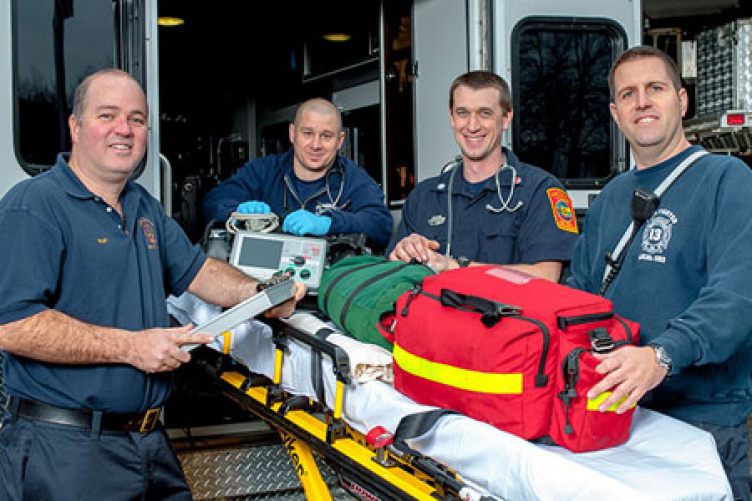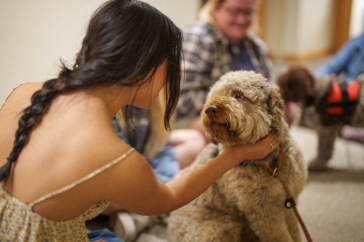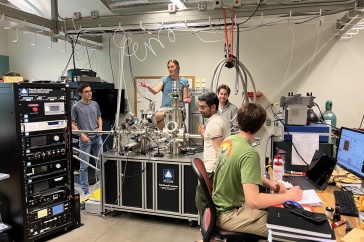
Members of the Laconia Fire Department who prepared for a national exam with the help of UNH Clinical Associate Professor Katherine Lockwood include, left to right, Deputy Fire Chief Shawn Riley, Firefighter/Paramedic Duane Mann, Firefighter/EMT Ray Bushey and Firefighter/EMT Chris Beaudoin.
When some of New Hampshire’s most experienced emergency medical technicians (EMTs) first learned about a tough new national exam they are required to pass, more than a few worried that the strong, steady pulse that had defined their careers was about to flat-line.
“There were a lot of guys who were very stressed out about the test,” says Shawn Riley, deputy fire chief for Laconia, NH and LRGHealthcare, which serves the Lakes Region, “because they realized if they didn’t pass, it meant a lot of them could lose their jobs.”
|
Mary Katherine Lockwood, clinical associate professor |
As emergency responders across the Lakes Region sought help, Riley called his “911” source for emergency care training: Mary Katherine Lockwood, a clinical associate professor in the Department of Molecular, Cellular and Biomedical Sciences at the University of New Hampshire.
In addition to teaching at UNH, Lockwood is a highly regarded EMT instructor who has served on emergency medical and ambulance crews for 25 years. After talking with Riley, she created a special one-day seminar last summer covering the toughest parts of the new exam, and delivered it – free of charge – to 55 EMTs from 18 communities in the Lakes Region.
The grade she received: 100 percent of the EMTs who took it rated Lockwood a “5” on a scale of 1-to-5 for outstanding instruction.
“She has a way of taking really complex material and making it simple and easy to understand, and even fun,” Riley says. Even better, he adds, the students in Lockwood’s seminar achieved a high success rate in passing the exam on the first try.
What makes the 135-question test particularly challenging is new material on advanced anatomy and physiology, and biochemistry; taking a step beyond the practical, hands-on clinical knowledge of patient care that defined EMT training years ago. But while Lockwood earned a doctoral degree in nutrition and biological chemistry from the University of California in Los Angeles (UCLA), many of the EMTs she teaches do not have college degrees.
“A lot of these guys sort of hit a brick wall when it came to science in high school,” says Lockwood, who continues to serve as a volunteer EMT in her hometown of Amherst, NH. “So what I try to do is to make this material interesting enough, and fun enough, that they can see they really can do it. And once they see that, once they break down that brick wall, they find out that the science isn’t nearly as hard as they thought.”
For Lockwood, the Lakes Region seminar is added confirmation that she was wise to take her first EMT course and volunteer on an ambulance more than 25 years ago – a step she took when she was teaching at UCLA so that she could better understand the needs of her students preparing for careers in nursing, occupational and physical therapy, nutrition and medicine.
Lockwood conducted a similar seminar in Epping, NH, for 33 emergency medical system instructors on strategies for teaching anatomy and physiology to EMT students. "By teaching instructors, Katherine exponentially expands the number of students that she touches indirectly," says Shawn Jackson, education coordinator for the state Division of Fire Standards and Training and Emergency Medical Services.
Riley expressed his gratitude for her work in Laconia in a recent letter to Jon Wraith, dean of the UNH College of Life Sciences and Agriculture. “I cannot thank her or UNH enough,” Riley wrote.
Returning to the fire station after a recent ambulance call, several Lakes Region EMTs who took Lockwood’s seminar say it also gave them added confidence and inspired them in pursuing additional self-study preparations ahead of the exam. “For her to come up here and cover all that material the way she did, it was great. It really made a difference,” says Duane Mann, a firefighter/paramedic in Laconia.
Originally published by:
UNH Today
-
Written By:
Staff writer | Communications and Public Affairs

















































